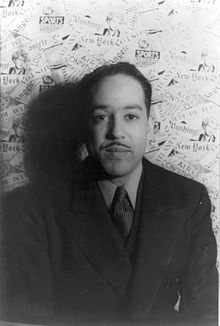War and its consequences wreak havoc on countless lives with its numerous casualties — whether they are civilian members or the soldiers involved on either side. In his poem, “Peace,” one of my all-time favorite poets, Langston Hughes, captures the irony of war’s goal to achieve peace no matter what — even if the very origins for the fighting become unclear. In its eight short lines, “Peace” encourages readers to reflect about whether war is actually worth all of the pain and grief that loved ones endure when the soldiers fighting to attain the precious goal of peace end up losing their lives in the process.
In a sense, whether “winners or losers” should rejoice or mourn the outcomes of the battles fought should not really matter unless they are mourning those individuals who lost their lives in the process of achieving peace in such violent and gruesome manners.
Hughes commences his poem in a solemn tone when he says, “We passed their graves:/The dead men there,/Winners or losers,/Did not care.” By mentioning how the “dead men…did not care,” Hughes is emphasizing how futile war can be when those involved in fighting for peace are not there to enjoy its benefits. In a sense, whether “winners or losers” should rejoice or mourn the outcomes of the battles fought should not really matter unless they are mourning those individuals who lost their lives in the process of achieving peace in such violent and gruesome manners.
In the second half of “Peace,” Hughes discusses how “In the dark/They could not see/Who had gained/The victory” demonstrates the overall finality of death. These lines make readers think: What is the point of fighting for something — regardless of how important it might seem in the beginning and while you are fighting — if you do not get to enjoy the rewards and benefits of the outcome in the long run?
Thinking the ultimate consequences of starting wars might prevent more people from committing to something that will ultimately end in many families losing beloved members and having to struggle and cope with the grief over their permanent absences.
The stark brevity of each line reinforces Hughes’ message that people ought to think more about whether war is absolutely necessary. The ultimate consequences of one war might prevent more people from committing to something that will end in more loss in another, in more families having to struggle and cope with the grief over their permanent absences. It shouldn’t have to be a question about whether life is worth sacrificing when it comes to the choice of fighting in violent and gruesome ways rather than talking it through and reaching agreements in a more diplomatic manner.
“Peace” serves as a great example of a funeral poem that both honors the lives lost of soldiers and leaves those mourning them with a lot of food for thought about war’s consequences. Death and grief are ultimately inevitable. We are brought to ask ourselves, however, to what extent war could be avoided.

 “Peace” by Langston Hughes
“Peace” by Langston Hughes





 Composting Bodies Is Now Legal in a Dozen States
Composting Bodies Is Now Legal in a Dozen States
 “Hand to Earth” by Andy Goldsworthy
“Hand to Earth” by Andy Goldsworthy














